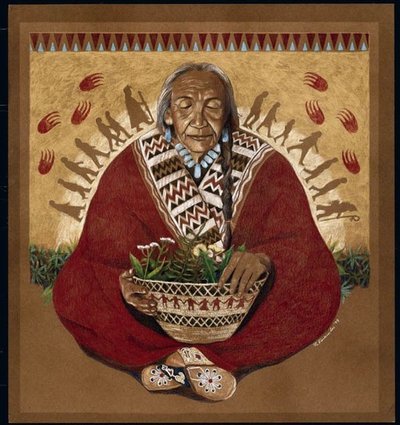March 2, 2006
Seeking to reduce cancer in Native Americans
There is no word for cancer in most American Indian and Alaska Native languages. Yet cancer is the second leading cause of death for American Indians and the leading cause of death among Alaska Natives.
“American Indian and Alaska Native populations experience the worst cancer-related disparities of any minority group,” said Dr. Dedra Buchwald, principal investigator for the Regional Native American Community Networks Program (RNACNP) at the UW.
“These populations have the poorest survival from all cancers compared with all other racial and ethnic groups.”
The program has received a $3.5 million grant from the National Cancer Institute to address cancer-related disparities among American Indians and Alaska Natives in the Pacific Northwest and Northern Plains states.
The program will collaborate with 67 tribes in Washington, Oregon, Idaho, Montana, North Dakota, South Dakota and Wyoming, and 11 tribes in 233 Alaska Native communities to address the root causes of health disparities. The Community Networks Program will work with community organizations, tribal colleges, training programs and academic institutions to develop education, research and outreach possibilities.
“Many factors contribute to health-related disparities experienced by these populations. Inequities in cancer disease burden and health care stem, in part, from issues of poverty, educational barriers, and lack of awareness of cancer screening and prevention resources,” Buchwald said.
The program targets cancers and associated risk factors that are most common among American Indians and Alaska Natives, that result in the greatest disability and mortality, and that are amenable to interventions of education, screening, or lifestyle modification.
The highest incidence of cancer in American Indian and Alaska Native women (breast, cervical, and colorectal) and men (colorectal) are also ones for which screening methods are recommended or have risk factors that can be modified through lifestyle change and education.
The team will develop education, research and outreach programs that address the root causes of health care inequities. Goals of the project include raising awareness and assessing need and resources, according to Gail Harrell Colfax (Lakota), administrator and outreach manager.
“This project will provide cancer education training curricula in tribal communities as an important part of our outreach activities. Posters and brochures featuring contemporary Native American artists are being produced and will help deliver information on different types of cancer,” Colfax said, adding that information will be distributed at Native American events, such as health fairs, pow wows, and such sporting and cultural events as Race on the Rez and the Northwest Tribal Canoe Healing Journey this summer.
Colfax said the program is working with tribes to determine what type of cancer screening and services are currently offered at tribal health clinics. She noted that many tribes and villages in rural areas don’t have health clinics. “Once we know the needs of those communities, we plan to identify cancer health resources in their geographical areas.”
Another critical need of these two populations is access to research resources. There are very few Native researchers or community-based investigations that effectively partner with Native populations.
These populations also have limited access to clinical cancer research trials and health-promoting behavior interventions.
Rose James (Lummi) of the program’s community faculty and a senior fellow in the UW Center for Genomics and Healthcare Equality, has been working for four years to bridge the communication gap between tribes and such resource-rich institutions as the UW and Fred Hutchinson Cancer Research Center (FHCRC).
“Collaborative relationships with reservation and urban Indian communities and health centers will be instrumental in our approach towards development of for Rural Health Improvement in South Dakota, Lummi Tribal Community Health Programs and Human Protections, Northwest Indian College, Black Hills Center for American Indian Health, Office of Alaska Native Health Research, Center for Rural Health-University of North Dakota, University of South Dakota, and the Northwest Region Cancer Information Service.
To learn more, contact Gail Harrell Colfax, administrator and outreach manager, at 206-543-3268, gharrell@u.washington.edu, or Steve Charles (Haida/Tlingit), outreach and research assistant, 206-543-5342, stevec3@u.washington.edu.

